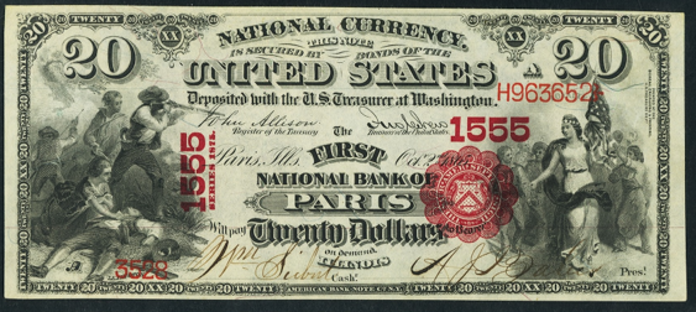Twenty Dollar Notes › Nationals › 1875 Twenty Dollar National Bank Notes › Iowa Charters › 1875 $20 Glenwood Iowa Mills County National Bank
Get Value Now
| Item | Info |
|---|---|
| Series | 1875 |
| Charter | #1862 Mills County National Bank of Glenwood, Iowa |
| Year Chartered | 1871, 153 Banks Chartered |
| City Info | Glenwood is a city in and the county seat of Mills County, Iowa, United States. The population was 5,269 in the 2010 census, a decline from 5,358 in the 2000 census. Located in a hollow of the Loess Hills on the east side of the Missouri River, Glenwood was established by Mormons in 1848 as Coonsville. It prospered during the California Gold Rush largely due to the grain mill on Keg Creek. Coonsville was the scene of anti-Mormon mob violence, became the county seat of Mills County in 1851, and was renamed Glenwood after most of Mormons left for Utah in 1852. Glenwood is named for a Presbyterian minister, Glenn Wood. The community supported the creation of Nebraska Territory in 1854. Two Glenwood attorneys were elected to the Nebraska territorial legislature, and they were run out of town for accepting shares in Scriptown. At the end of the Civil War, an Iowa Veteran's Orphans Home was founded here. The evangelist Billy Sunday lived at the orphanage as a child. Source: Wikipedia |
| Similar Cities | City name is unique, no others like it. |
| Seal Varieties | Red with scallops |
| See Also | If your note doesn't match try: 1. 1882 $20 National Bank Notes 2. 1882 $20 Gold Certificate 3. 1875 $20 Legal Tender 4. 1878 $20 Legal Tender |
| Other Info | 1. Value depends on notes known for charter, condition and market demand. |
| Neat Fact | Notes from common charters are less valuable compared to rarer charters. Value also depends on type, denomination and total notes known for city, state and region. Ultimate determination of value is collector demand. |
No Obligations Offers and Appraisals
Please submit a good photo or scan. It will be identified and evaluated. Understand there may be subtle differences between the image you see above and your note. Signatures, design, markings and note condition will determine the offer price. Notes in Uncirculated or better condition receive the best offers.
Appraisals can be estimated for wholesale and retail prices. Wholesale is what dealers typically pay. Retail is what a collector might pay. Retail is slightly higher in most cases.
Please visit this page for USA Paper Money Reference. Do not treat this page as a reference guide, it is for appraisal and acquisition purposes only.
